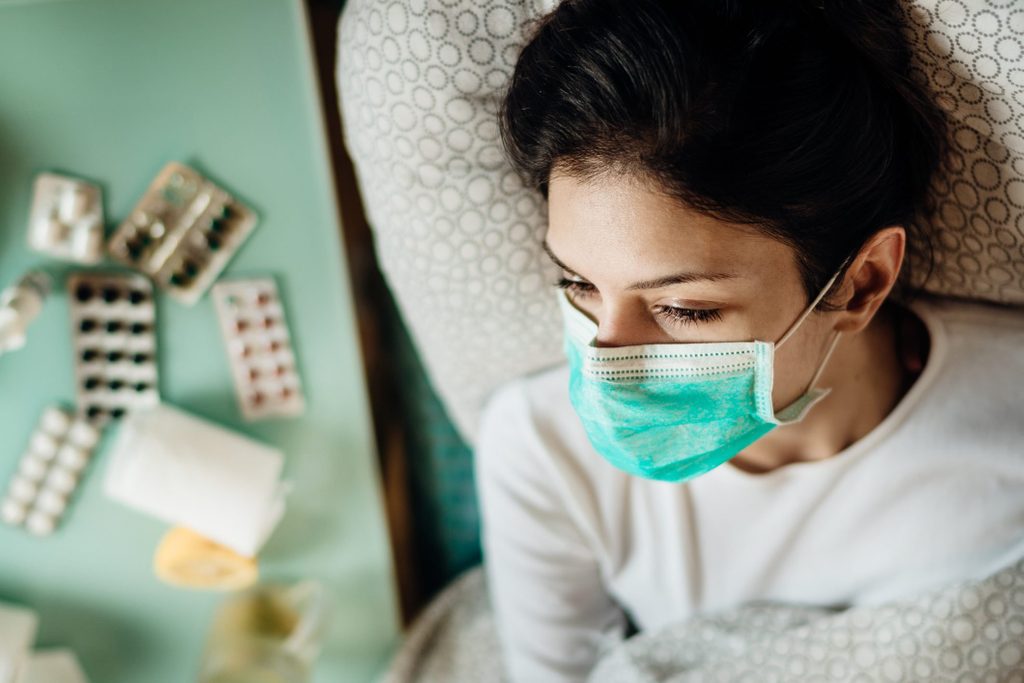Can Covid-19 Trigger Autoimmune Reactions? Here’s the Science so Far

Covid-19 may trigger autoimmune conditions in some people, but there's much that scientists are still learning.
One of the many troubling aspects of Covid-19, which continues to surge, is that it can cause your immune system to mistakenly attack your body. This is what’s known as an autoimmune response. And it can cause as much damage as the virus itself—maybe more.
“Normally, an immune response is beneficial. That’s how you fight off infections,” says Aaron Glatt, a spokesperson for the Infectious Disease Society of America. “There’s something about Covid-19 that makes the immune system go haywire in certain patients and we don’t know why.”
Here’s what science knows so far about Covid-19 and autoimmunity.
Infections and autoimmune reactions
The link between infections generally and autoimmune responses is not new, says Shoghik Akoghlanian, a pediatric rheumatologist with Nationwide Children’s Hospital in Columbus, Ohio. A variety of germs, including bacteria and viruses, have been known to trigger autoimmune reactions.
For example, strep (streptococcus bacteria) infections have been associated with symptoms of autoimmune arthritis, she notes. And human herpesvirus-6, hepatitis A and C, Epstein-Barr virus, rubella, and other viruses have been linked with a higher risk of rheumatoid arthritis, lupus, multiple sclerosis, and other autoimmune conditions.
Coronavirus-linked autoimmunity, though, appears to be more widespread, says Deepa Gotur, a specialist in critical care at Houston Methodist Hospital. And it seems to affect more parts of the body, from your toes (“Covid toes”) to your heart, and runs the gamut from not-too-serious to life-threatening.
There’s no proof yet that SARS-CoV-2, the virus that causes Covid-19, actually causes the autoimmune reaction. But it certainly seems likely given that the reactions occur during or after the acute infection.
(Related: Does Covid-19 Raise Your Risk of Mental Illness?)
Cytokine storms
This is a term we’ve heard a lot since the pandemic began almost a year ago. A cytokine storm happens when the immune system throws out a mob of immune-system proteins and growth factors, called cytokines, according to a study published in a June 2020 issue of Frontiers in Immunology. High levels of these substances, normally intended to ramp up the inflammation needed to fight invaders, can overwhelm and damage the body, potentially leading to organ failure and even death.
Covid-19 can certainly result in cytokine storms. But so can other infections as well as autoimmune and other diseases.
Cytokine storms may be propelling some of the Covid-19-related autoimmune responses, although we don’t know why, says Dr. Glatt, who is also chairman of medicine and hospital epidemiologist at Mount Sinai South Nassau and professor of medicine at the Icahn School of Medicine at Mount Sinai in New York City. But other processes could be driving the response as well, he says.
Multisystem inflammatory syndrome in children
Multisystem inflammatory syndrome in children or MIS-C affects mostly kids and can damage many different parts of the body. It can manifest in several different ways, says Dr. Akoghlanian.
Often the symptoms mimic Kawasaki disease, a rare childhood condition that causes inflammation of the blood vessels and can lead to heart disease. The Kawasaki-like disease linked to Covid-19, tends to affect kids a little older than actual Kawasaki disease (six to nine years old versus under five).
MIS-C can also manifest as toxic shock syndrome and myocarditis (inflammation of the heart muscle). This seems to be the main autoimmune complications seen in children, while adults with MIS-C seem to have a broader range of complications, some of which are autoimmune reactions.
(Related: What You Need to Know About Canada’s New Three-Layer Face Mask Guideline)
Blood clots
Doctors have noted blood clots leading to strokes in many critically ill Covid-19 patients under the age of 50. Clots also raise the risk of having a heart attack.
In a study, released in November 2020 in Science Translational Medicine, researchers found about half of 172 hospitalized Covid-19 patients had antibodies known to contribute to the formation of blood clots. The antibodies were the same as those which appear in an autoimmune condition called antiphospholipid antibody syndrome.
These antibodies go after certain fats (phospholipids) on the surface of cells lining the blood vessels. This raises the risk of clotting. A study is underway to see if the blood thinner dipyridamole, long used to prevent blood clots, might also help Covid-19 patients who have these antibodies.
Neurological conditions
Some patients with Covid-19 have shown symptoms of neurological autoimmune conditions, suggests a study in the October 2020 issue of the journal Brain. This includes Guillan-Barre syndrome (GBS), which can lead to temporary paralysis. The flu virus, chlamydia bacteria, varicella (the virus that causes chickenpox), and a number of other infections are also known to trigger GBS.
As reported in Autoimmunity Reviews, few Covid-19 patients have shown symptoms of neurological autoimmune conditions. A 65-year-old man in Iran who had weakness in both arms and legs about two weeks after showing Covid symptoms was diagnosed with GBS. Two Covid-19 patients in Spain were also diagnosed with Miller Fisher syndrome, a type of GBS. Both recovered.
“There have been a couple of case reports about Guillan-Barre as well as Miller-Fisher,” says Dr. Gotur. Miller-Fisher syndrome causes nerve damage that can lead to abnormal muscle coordination, such as the paralysis of eye muscles, and the overall loss of reflexes.
(Related: ‘The Pandemic Is Changing How We Die. I’ve Seen It Firsthand.’)
Other autoimmune complications
Doctors have also seen immune thrombocytopenic purpura (ITP) in Covid-19 patients. This is an autoimmune disease marked by low levels of blood platelets, which are cells that help with blood clotting. And as with the other autoimmune conditions linked to Covid-19, ITP can be triggered by many other infections.
One 65-year-old woman with Covid-19 recovered from ITP after receiving intravenous immunoglobulin (IVIG) and a platelet transfusion.
Another autoimmune complication of Covid-19 may be hemophagocytic lymphohistiocytosis, which is a systemic inflammatory syndrome that causes the body to overproduce activated immune cells, according to the Genetic and Rare Diseases Information Center. This could potentially be fatal.
What if you have a preexisting autoimmune condition?
Experts have speculated that people who already have an autoimmune disease, like rheumatoid arthritis or lupus, may be at higher risk for Covid-19 complication both because of the disease itself and because they may be taking drugs that suppress their immune system. But according to the Global Autoimmune Institute, this does not seem to be the case in several different studies. It’s not clear why, although there are theories.
“They may be doing very well in terms of complying with public health measures,” says Dr. Akoghlanian. “And most of these patients have been managed at home, meaning they’ve had mild symptoms and aren’t going to the hospital.”
Regardless, anyone with an autoimmune disease should never stop medications without consulting their doctor first, she stresses.
(Related: 3 Tips to Help You Cope With Covid-19 Anxiety)
Treating Covid-19-related autoimmune conditions
Doctors use different drugs to treat autoimmunity issues linked to Covid-19. Many patients seem to respond to IVIG therapy, which helps turn off the autoimmune response. Some patients benefit from steroids, which are also sometimes used against autoimmune diseases not related to Covid-19.
Other drugs that have shown promise: anakinra, which is approved to treat rheumatoid arthritis; and tocilizumab and sarilumab, both of which are biologics also approved to treat rheumatoid arthritis.
“We’re applying the best of our knowledge from other experiences,” says Dr. Akoghlanian.
Preventing Covid-19 infections and complications
Like everyone else, people with preexisting autoimmune conditions should do everything they can to prevent contracting Covid-19. The simplest and best ways to do this? Wear a mask when you’re out, socially distance from others, and avoid large gatherings.
The Global Autoimmune Institute also recommends maintaining good eating habits and keeping yourself hydrated, which keeps your immune system humming at top capacity.
Avoid stress, exercise, and talk to your healthcare provider about your specific risks. And stay tuned for more information. What we know now is “just the tip of the iceberg,” says Dr. Akoghlanian.
Next: ‘I Have a Cloud Over Me’: How Isolation Affects Seniors Living at Home




